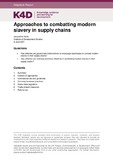| dc.contributor.author | Hicks, Jacqueline | |
| dc.date.accessioned | 2022-01-19T13:54:47Z | |
| dc.date.available | 2022-01-19T13:54:47Z | |
| dc.date.issued | 2021-06-08 | |
| dc.identifier.citation | Hicks, J. (2021). Approaches to combatting modern slavery in supply chains. K4D Helpdesk Report. Institute of Development Studies DOI: 10.19088/K4D.2022.004 | en |
| dc.identifier.uri | https://opendocs.ids.ac.uk/opendocs/handle/20.500.12413/17068 | |
| dc.description.abstract | The purpose of this rapid review is to lay out some of the general approaches used by both business and government to tackle ‘modern slavery’ in international business supply chains, and locate evidence of their effectiveness
International institutions have been encouraging large international businesses to tackle modern slavery by offering guidelines on how to investigate the issue in their supply chains (‘due diligence’), but their implementation, and ‘auditing’ is highly variable. National governments are increasingly mandating businesses through legislation to report on what they do. More recently, governments have begun imposing a legal duty of care on parent companies which means they can be held responsible for what their subsidiaries do.
Key findings are: There is no consistency in how international companies currently implement the due diligence guidelines; The design of national disclosure legislation is generally judged to be flawed. There is medium compliance in terms of quantity of company reports and low compliance in terms of quality; The design of national disclosure legislation is generally judged to be flawed. There is medium compliance in terms of quantity of company reports and low compliance in terms of quality.
Overall, the evidence on forced labour and modern slavery is recognised as being “dangerously thin and riddled with bias” (LeBaron, 2018, p.1). It is difficult to research directly because of its illegality, the involvement of powerful interests, and the potential to further endanger highly vulnerable workers. Nevertheless, there is a very large number of articles and reports written on the issue, particularly from the last five years. The main sources used in this review came from both grey literature and academic literature. | en |
| dc.description.sponsorship | FCDO (Foreign, Commonwealth and Development Office) | en |
| dc.language.iso | en | en |
| dc.publisher | Institute of Development Studies | en |
| dc.relation.ispartofseries | K4D Helpdesk Report;1012 | |
| dc.rights.uri | https://www.nationalarchives.gov.uk/doc/open-government-licence/version/3/ | en |
| dc.subject | Migration | en |
| dc.subject | Rights | en |
| dc.title | Approaches to Combatting Modern Slavery in Supply Chains | en |
| dc.type | Helpdesk | en |
| dc.rights.holder | © Crown copyright 2021 | en |
| dc.identifier.doi | 10.19088/K4D.2022.004 | |
| dcterms.dateAccepted | 2021-06-08 | |
| rioxxterms.funder | Default funder | en |
| rioxxterms.identifier.project | K4D | en |
| rioxxterms.version | VoR | en |
| rioxxterms.versionofrecord | 10.19088/K4D.2022.004 | en |
| rioxxterms.funder.project | 0986883a-6d0f-4bb8-9c46-5e0682934d65 | en |

